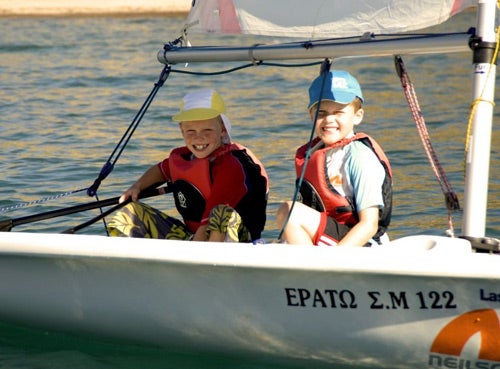Croatia is just the place to learn the ropes
The island of Korcula is a good port of call for novice sailors. Natalie Holmes takes her children for a waterborne break

'Just sign here ... and again here." I did as instructed, and, with a "See ya", and a "Bye Mum", my children were whisked from my sight. We were in Lumbarda, on the Croatian island of Korcula, learning to sail. At least I was hoping to learn to sail. Ruby, 12, and James, 9, had joined the Hot Shots kids' club and had a hectic programme of sailing, windsurfing, kayaking and snorkelling with their instructor, Tom.
Which left me free to saunter down to the beach and marvel at the array of boats and enthusiastic instructors keen to make seaworthy a motley bunch, including me. Having spent a day at sea a year ago, I was put in "advanced beginners" under the instruction of Jake. We started with some theory and the talk of jibs, gybes and various ropes, each with their own name, was strangely hypnotic – I soon found myself wondering what we'd eat for dinner.
Pasta as it turned out. Lumbarda is beautiful but Croatia's much-hyped food renaissance has passed it by, with grilled meat and fish and the ubiquitous pizza and pasta being the local restaurant staples. Still, James was very happy with his plate of prsut (prosciutto up the coast), that would have fed the crew of a small flotilla.
The next day, I was out in my Pico dinghy, tacking and gybing (turning, land lubber) in an astonishingly (to me) proficient manner. Such was my confidence that I decided we would take the next day off to visit the nearby island of Mljet, whose beauty so enchanted a shipwrecked Odysseus that he stayed seven years, or so, legend has it.
Mljet is as long as Korcula, (about 50km) but with only 800 inhabitants. Half of it is a national park and its main boast is its two saltwater lakes, the inner of which is as warm as a tepid bath, with a salt content so high that you float easily. The other is home to a jellyfish that is found nowhere else in the world, which, we were assured, does not sting.
From here we took a boat to the Benedictine monastery of Santa Maria, built on an island on the larger lake in the 12th century, now a restaurant, where the monks must have lived in almost unimaginable isolation and tranquillity. There is one hotel on Mljet, the Odisej at the port of Pomena. Our holiday company, Neilson, used to be based here but relocated because the sea crossings were too unreliable.
Lumbarda provided an ideal alternative because it is an easy sail to nearby, smaller islands, which give learners the impression that they can get somewhere on their own.
So, having spent a day successfully negotiating my way upwind and downwind, I signed up for the "day sail", where we would follow a lead boat to another island.
But the winds were too high for me to sail alone, so I went along in the kids' boat with captain Tom. While the children hitched and unhitched sheets (ropes), squabbled over the tiller and hung off the side for extra speed, my only job was to look out for dolphins or, equally exciting, naked Germans sunbathing on the shore.
What possessed me after this day of triumphant non-activity to sign up for the final day's regatta? We were a mixed bunch in about a dozen boats ranging from single-handed novices, such as myself, to many-handed craft with experienced crew, such as Tom and the Hot Shots (they came second, damn them). Jake marked out a triangular course of about 800 metres which we were meant to sail around twice.
The whistle blew and we were off, or rather, they were off. I was going nowhere and realised that the lesson I had bunked out of was how to get "out of irons" when your boat is so positioned against the wind, that it will not move. After being rescued, I started to advance at a stately pace toward the first buoy.
By this time the leaders were finishing their first lap and I got to the end of my first lap just as the winners completed their second. Still, I did sail (or drift) single-handed across 800 metres of sea. Some-thing that was unimaginable at the start of the week.
How to get there
Natalie Holmes and family travelled as a guest of Neilson (0870 366 1517; neilson.co.uk). A week at the Hotel Lumbarda starts at £809 per adult and £648 per child this summer, including return flights from Gatwick, breakfast and water sports tuition and equipment hire.
Join our commenting forum
Join thought-provoking conversations, follow other Independent readers and see their replies
Comments
Bookmark popover
Removed from bookmarks